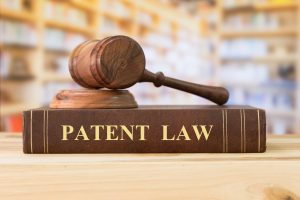
Last
month,
I
presented
Part
I
of
my
written
interview
with
patent
attorney
and
host
of
Clause
8,
Eli
Mazour.
That
column
presented
his
answer
to
the
first
of
my
three
questions
and
focused
on
the
evolution
of
the
Clause
8
podcast
series.
What
follows
are
Eli’s
answers
to
my
remaining
two
questions.
As
usual,
I
have
added
some
brief
commentary
to
his
answers
below,
but
have
otherwise
presented
his
answers
as
he
provided
them.
Gaston
Kroub:
What
has
been
notable
about
the
early
days
of
the
Voice
of
IP
newsletter?
Eli
Mazour:
I
have
ended
up
doing
much
more
original
reporting
about
the
United
States
Patent
and
Trademark
Office
(USPTO)
than
I
expected.
My
most
popular
newsletter,
so
far,
solved
the
mystery
surrounding
a
“Welcome
Letter”
issued
by
the
USPTO.
In
the
process,
I
talked
to
a
USPTO
official
and
broke
some
other
news
related
to
the
USPTO’s
current
efforts.
Other
popular
ones
broke
news
of
soaring
rates
of
Section
101
rejections
at
the
USPTO
and
USPTO’s
plans
for
new
Section
101
guidance.
I
ended
up
writing
about
these
topics
because
curious
patent
practitioners
reached
out
and
I
decided
to
look
further
into
the
topics.
The
USPTO
is
a
$4.5
billion
government
agency
that
wields
enormous
power.
As
far
as
I
know,
except
for
IPWatchdog
breaking
big
USPTO
news
and
Julie
Burke
on
LinkedIn,
there’s
no
one
constantly
looking
into
what
the
agency
is
up
to.
So,
although
the
USPTO
is
full
of
well-meaning
people,
it’s
used
to
operating
mostly
below
the
radar.
I
think
there’s
a
great
appetite
from
the
IP
community
to
know
more
about
what
is
happening
with
the
USPTO
and
why.
I’m
not
sure
if
I’ll
be
able
to
keep
breaking
news
about
the
USPTO,
but
I
want
to
continue
to
help
explain
what
the
USPTO
is
currently
doing,
shed
light
on
what
it’s
likely
to
do
in
the
future,
and
provide
practical
tips
for
dealing
with
those
developments
along
the
way.
GK:
Eli’s
reporting
on
the
scuttlebutt
out
of
the
USPTO
continues
the
storied
tradition
of
this
site’s
predecessor,
Underneath
Their
Robes,
David
Lat’s
insider
look
at
the
judiciary.
Considering
its
importance
to
today’s
IP-driven
economy,
it
is
surprising
that
there
is
not
more
coverage
of
USPTO
goings-on.
At
the
same
time,
it
is
great
that
the
Voice
of
IP
has
managed
to
fill
some
of
the
void,
which,
coupled
with
Eli’s
podcasting
prowess,
allows
readers
and
listeners
to
learn
things
about
the
IP
ecosystem
that
are
simply
unavailable
elsewhere.
I
for
one
am
looking
forward
to
more
Voice
of
IP
scoops
on
under-reported
on
IP
developments
going
forward.
GK:
What
excites
you
most
about
your
return
to
Biglaw
practice?
EM:
I’m
most
excited
about
joining
a
team
at
Foley
that
believes
in
the
value
of
patents
and
helping
clients
obtain
patents
in
the
best
possible
way.
It
has
also
been
really
cool
to
meet
and
learn
from
other
Foley
attorneys
from
very
different
practice
areas.
To
be
honest,
I
never
thought
I’d
move
back
to
Biglaw
before
my
now
colleague
Ngai
Zhang
asked
me
to
join
his
team
at
Foley.
However,
there’s
a
few
reasons
I’m
particularly
excited
about
making
this
switch
at
this
moment
in
time.
First,
over
the
last
few
seasons
of
Clause
8,
I’ve
noticed
the
best
chief
IP
and
patent
counsel
taking
a
step
back
and
asking
fundamental
questions
about
their
companies’
patent
strategies.
I
think
the
impact
of
the
great
recession
coinciding
with
the
weakening
of
America’s
patent
system
caused
many
tech
companies
to
focus
on
cutting
fees
while
continuing
to
pursue
the
same
large
number
of
patents.
To
some
extent,
their
thinking
was
that
patents
aren’t
important
but
they’ll
have
a
huge
stack
in
case
they
ever
need
to
rely
on
them.
However,
when
they
ended
up
being
involved
in
some
cross-licensing
negotiation,
litigation,
or
tricky
deal,
they
discovered
it
doesn’t
quite
work
that
way.
Huge
stacks
of
likely
worthless
patents
not
tied
to
any
implemented
technology
aren’t
any
better
in
those
situations
than
small
stacks
of
patents.
If
anything,
those
companies
wasted
more
engineers’
time
and
company
resources
obtaining
and
maintaining
those
patents.
At
the
same
time,
even
with
all
the
changes
to
America’s
patent
system,
it’s
still
possible
to
build
valuable,
relatively
reliable
patent
portfolios.
The
savviest
in-house
patent
counsel
observed
all
of
that
and
concluded
that
obtaining
patents
just
for
the
sake
of
obtaining
patents
is
the
wrong
approach.
If
the
objective
is
to
save
money,
the
best
way
to
do
that
is
not
to
file
patent
applications
altogether.
However,
if
the
objective
is
to
contribute
to
a
company’s
success,
then
the
company
needs
a
clear
vision
about
the
role
of
patents
for
the
company.
That
seems
to
be
leading
many
of
them
to
conclude
that
if
their
companies
will
be
making
the
significant
investment
internally
and
externally
to
obtain
patents,
then
they
should
focus
on
building
valuable
patent
portfolios
that
the
company
can
hopefully
rely
upon
as
expected.
So,
I
believe
there’s
a
real
appetite
for
innovative
patent
prosecution
counsel
that
knows
the
most
effective
approach
to
achieve
that
overall
strategy.
I
think
that
can
be
done
at
any
sized
firm
but
fits
well
within
a
firm
driven
by
delivering
the
best
possible
outcomes
for
sophisticated
business
clients
instead
of
just
churning
out
patents.
Second,
I’m
excited
about
how
advancements
in
automation,
AI,
and
other
technologies
will
increasingly
make
it
possible
to
efficiently
provide
the
same
types
of
legal
services
at
any
sized
firm.
I’ve
previously
enjoyed
helping
develop
and
implement
such
systems.
However,
I
do
think
there’s
a
risk
of
sacrificing
quality
by
prioritizing
relying
on
those
types
of
technologies
purely
for
time
savings
instead
of
focusing
on
leveraging
the
technology
to
provide
even
better
results.
I
think
the
latter
really
does
have
to
be
part
of
the
DNA
of
a
patent
prosecution
practice
to
sustain
that
focus
over
time.
I’m
also
looking
forward
to
helping
diverse
clients
in
a
more
holistic
way.
For
example,
I’ve
loved
providing
guidance
throughout
the
years
about
navigating
and
impacting
patent
policy
developments
at
the
USPTO,
in
Congress,
and
other
parts
of
government.
I’m
excited
about
the
possibility
of
incorporating
that
as
a
more
regular
part
of
my
practice.
GK:
As
Eli’s
answer
demonstrates,
Biglaw
firms
continue
to
offer
a
compelling
potential
home
for
forward-thinking
and
client-focused
patent
attorneys.
As
with
anything,
timing
is
of
paramount
importance
when
considering
a
career
move,
so
it’s
great
to
see
that
Foley
and
Eli
were
able
to
sync
up
at
a
point
where
Eli’s
skill
set
can
be
put
to
optimal
use
in
terms
of
providing
strategic
patent
advice
to
Foley’s
existing
and
prospective
client
base.
It
will
be
exciting
to
see
this
new
partnership
in
action
over
the
coming
years.
My
thanks
to
Eli
for
the
insights
and
cooperation,
and
I
wish
him
continued
success
and
fulfillment
with
his
return
to
Biglaw
and
the
Voice
of
IP
newsletter.
As
I
have
said
before,
it
is
always
a
privilege
to
hear
from
an
established
IP
personality,
especially
one
with
such
a
big
role
to
play
in
shaping
today’s
discourse
around
patent
issues.
I
am
always
open
to
conducting
interviews
of
this
type
with
other
IP
thought
leaders,
so
feel
free
to
reach
out
if
you
have
a
compelling
perspective
to
offer.
Please
feel
free
to
send
comments
or
questions
to
me
at
[email protected]
or
via
Twitter:
@gkroub.
Any
topic
suggestions
or
thoughts
are
most
welcome.
Gaston
Kroub
lives
in
Brooklyn
and
is
a
founding
partner
of
Kroub,
Silbersher
&
Kolmykov
PLLC,
an
intellectual
property
litigation
boutique,
and Markman
Advisors
LLC,
a
leading
consultancy
on
patent
issues
for
the
investment
community.
Gaston’s
practice
focuses
on
intellectual
property
litigation
and
related
counseling,
with
a
strong
focus
on
patent
matters.
You
can
reach
him
at [email protected] or
follow
him
on
Twitter: @gkroub.
















